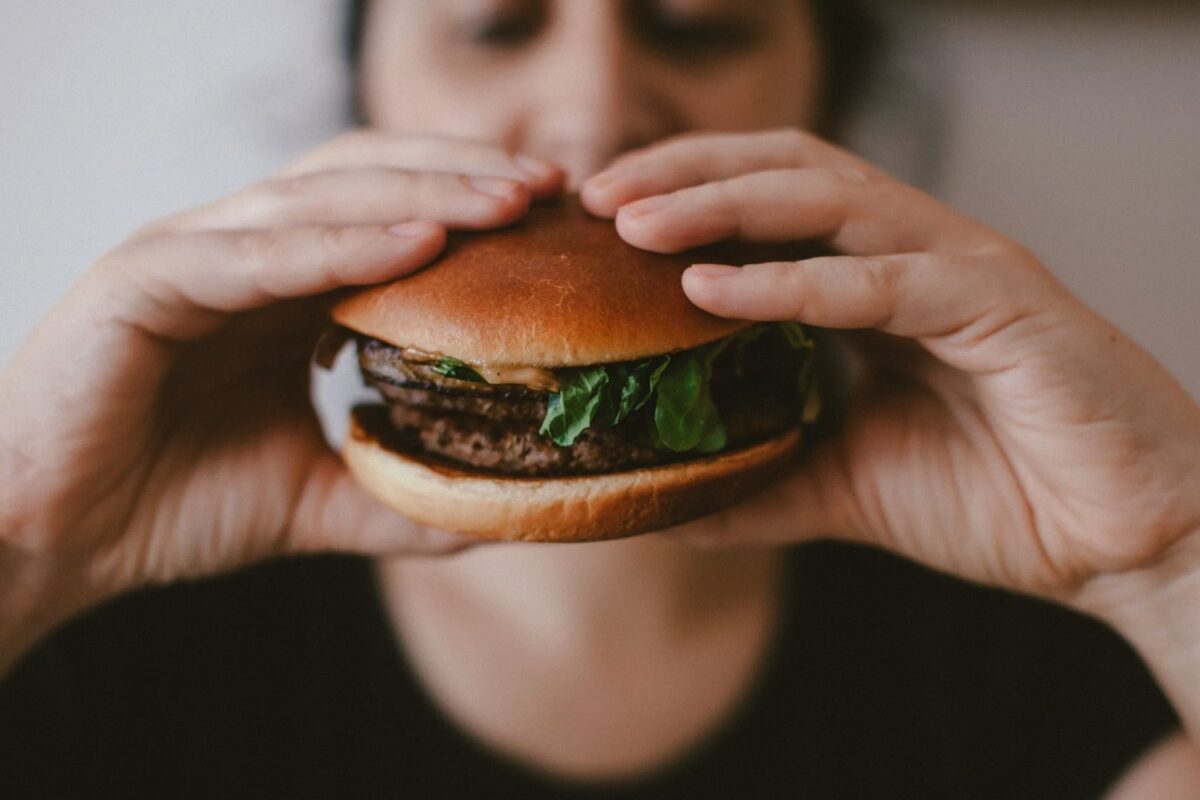We all know that junk food isn’t particularly good for our waistlines, but it turns out it can also be terrible for our mental health – and Australian men might be more vulnerable than most.
Distinguished psychologist, nutritionist, and former Great British Bake-Off contestant Kimberley Wilson’s latest book, Unprocessed: How the Food We Eat is Fuelling Our Mental Health Crisis, makes some revealing claims about how our diets can impact both our IQ and our mental health.
In particular, Wilson’s interest centres on ultra-processed foods, catchily dubbed ‘UPFs’. This is an umbrella term for any food or drink that contains those inscrutably named ingredients you might find on the back of a pack of lollies or buried deep in the Hungry Jack’s website: maize starch, ascorbic acid, potassium sorbate, that sort of thing.
Wilson’s data suggests that 57% of the American diet and 55% of the British diet are comprised of UPFs, compared with a staggeringly slight 14% for Italians. She gives no exact data on the Aussie diet, but given that the US and Italy are used as the top and bottom ends of her data set, we can assume that Aussies fall somewhere in between.
Given the ready availability of junk food on almost every high street across the country, we’d hedge our bets on being at the higher end…

This is already widely known, and a huge amount of time and resources have been allocated by policymakers to curb the health effects caused by the proliferation of junk food. However, the problem that Wilson raises is this: nearly all that effort has been directed towards battling the obesity and heart disease brought on by junk food – the physical effects – and virtually none has been given to the purported impact on mental health.
This is perhaps unsurprising given that obesity and heart disease represent the greatest economic strain on health services around the world, but it makes the neglect of mental health no less concerning.
Why UPFs are so bad for your mental health
Before we go on, it’s worth pointing out that mental health can be affected by a huge range of factors other than your diet – traumatic, social, economic and physiological factors are all at play – but Wilson highlights a lack of attention given to one aspect in particular: how a diet high in UPFs can affect brain function.
The human brain is a massive organ; it accounts for 23% of energy use when resting, and this goes up to 74% for young children and babies. It’s also one of the fattiest organs in the body, and Omega-3 fats are “essential to the structural integrity of and proper functioning of our brains”.

Fatty fish and seafood are one of the best sources of Omega-3, followed by nuts, soy, and seeds. UPFs are, unsurprisingly, incredibly low in Omega-3 content and, therefore, don’t contribute to optimal brain functioning and emotional regulation.
Similarly, the National Health and Medical Research Council has found that diets high in refined carbohydrates (prevalent in junk and snack foods) can increase the risk of symptoms of depression. In contrast, a diet high in whole foods like fruit, vegetables, legumes and moderate amounts of dairy is associated with a reduced risk of depression.
It’s not clear precisely why this is, but it’s likely linked to the changes in blood sugar levels and effects on microorganisms that live in the gut that these foods can have.
RELATED: How To Inoculate Yourself Against ‘Bulls***’ Nutrition Advice
Why Australian men are more at risk
But why does this matter more for men, exactly? Because not only are men eating more junk food than women but they’re also suffering mental health issues more often.

According to the US-based Centre for Disease Control and Prevention, men are huge consumers of fast foods: 38% of men eat fast food on any given day, compared with 35.4% of women. Young men are particularly big users, with 46.5% of men 20 to 39 eating fast food, compared to 43.3% of women the same age.
Meanwhile, the Australian Men’s Health Forum presents separate but closely-aligned data suggesting that men, especially young men, are suffering from greater mental health issues in some areas: boys are more likely to “act out” and externalise problems, with boys accounting for 72.1% of children with ADHD and 62.7% of children with Conduct Disorders.
Moreover, men are more likely to experience mental disorders in all three major categories (e.g. anxiety, depression and alcohol abuse) than women, with middle-aged and older men still four to six times more likely to commit suicide.
RELATED: Australians Will Do Anything To Improve Their Mental Health, Except Quit Drinking
Now, don’t get us wrong: we’re not saying that eating your veggies and cutting out the McNuggets is a one-stop shop for treating your mental health. As we said earlier, there’s a huge number of factors at play.

What we do know is that eating well is the most widely-used male tactic for combating depression, with 54.2% of men citing diet as the most important part of their mental health regime.
Combine that with Kimberly Wilson’s research on UPFs, and we reckon here’s a pretty compelling case for making sure that what goes in your mouth is doing good for what goes on inside your head. As the age-old saying goes, how could 6 million Aussie blokes be wrong?
